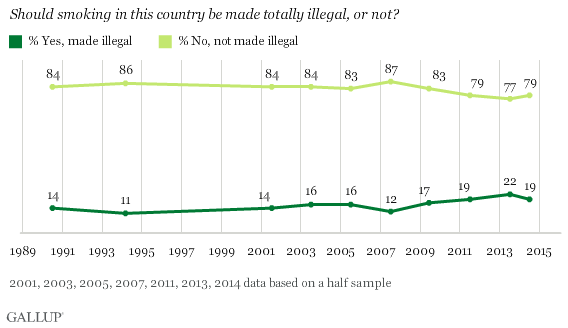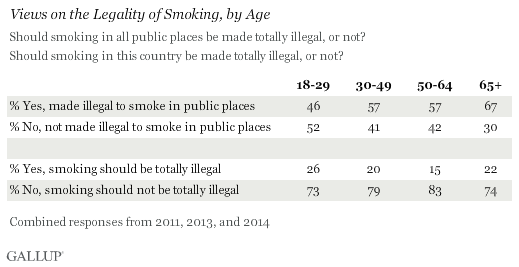WASHINGTON, D.C. -- A majority of Americans, 56%, are in favor of making smoking in public places illegal. This is in line with what Gallup has measured since 2011. By contrast, until 2008, Gallup found most Americans were opposed to a ban on smoking in public places, with as few as 31% in favor of such a ban in 2003.

The latest results come from Gallup's July 7-10 Consumption Habits survey, in which 21% of Americans report smoking cigarettes, near the historical low. Gallup first began asking about banning public smoking in 2001. At that time, 39% of Americans were in favor of making smoking in public places illegal, while 60% were against it.
Sometime between 2008 and 2011, when Gallup did not ask this question, attitudes shifted from a majority of Americans being against making smoking in public places illegal to a majority being in favor of making it illegal.
While the majority of Americans are currently in favor of making smoking in public places illegal, only 19% are in favor of making smoking in the U.S. completely illegal. The percentage who are in favor of making smoking totally illegal in the country has been largely steady since Gallup began asking this question in 1990, but it has ticked up slightly in recent years. From 1990 to 2001, an average 13% of Americans supported banning smoking completely. However, in the last two years, the average rose to 21%.

Young Less Likely Than Old to Support Banning Smoking in Public
Slightly more than a quarter of Americans aged 18 to 29 favor making all smoking illegal in the country, higher than the percentage of older Americans who say the same.
By contrast, a majority of Americans aged 30 and older support banning smoking in public places. Gallup's combined smoking attitudes data from 2011, 2013, and 2014 show that 46% of Americans aged 18 to 29 support banning smoking in public, more than 10 percentage points lower than what is found among older age groups.

These age differences may reflect Americans' different experiences with smoking, especially in public. While smoking in public was far more common a few decades ago, many states have recently enacted smoking bans, especially in public places like bars and restaurants, to protect residents from the harm of secondhand smoke. As a result, younger Americans may have grown up in places where smoking in public was already uncommon, if not illegal, and thus not feel as much of a need to ban it in public now or in the future.
Even though it is part of their lives, this year, one in 10 smokers say that smoking should be totally illegal in this country. Furthermore, about three in 10 smokers say that smoking in public places should be illegal. Other Gallup research has shown that most smokers want to quit and have tried. So smokers may want to make smoking illegal to either help them quit or to discourage others from picking up the habit.
Implications
Few Americans say that smoking should be totally illegal in this country, but a majority support making smoking in public places illegal. Smoking is already illegal in many public places, such as at airports, public parks, schools, bars, and restaurants, but these restrictions vary by state.
According to the U.S. Centers for Disease Control and Prevention, 25 states and the District of Columbia prohibit smoking indoors at worksites, restaurants, and bars. Seven states, Indiana, Kentucky, Mississippi, South Carolina, Texas, West Virginia, and Wyoming, have no statewide smoking restrictions. Gallup found that two of those states, Kentucky and West Virginia, have the highest smoking rates in the nation, with slightly less than a third of the adult population saying they smoke.
Furthermore, a 2013 Associated Press article reported that outdoor smoking bans in places such as parks and playgrounds have doubled in the last five years, which is in line with the increase in public support for banning smoking in public places that Gallup has measured.
Gallup has also found a link between bans on smoking and lower smoking rates. A majority of Americans are OK with banning smoking in public places, which would likely lower smoking rates. But nearly one in five Americans are willing to go even further and say that smoking should be completely banned in this country. Overall, however, most Americans, although they are aware of the health risks, say that smoking should not be made totally illegal.
Survey Methods
Results for this Gallup poll are based on telephone interviews conducted July 7-10, 2014, with a random sample of 1,013 adults, aged 18 and older, living in all 50 U.S. states and the District of Columbia.
For results based on the total sample of national adults, the margin of sampling error is ±4 percentage points at the 95% confidence level.
For results based on the sample of 494 national adults in Form A, the margin of sampling error is ±6 percentage points.
For results based on the sample of 519 national adults in Form B, the margins of sampling error is ±5 percentage points.
For results based on the sample of 176 smokers, the maximum margin of sampling error is ±9 percentage points.
Interviews are conducted with respondents on landline telephones and cellular phones, with interviews conducted in Spanish for respondents who are primarily Spanish-speaking. Each sample of national adults includes a minimum quota of 50% cellphone respondents and 50% landline respondents, with additional minimum quotas by time zone within region. Landline and cellular telephone numbers are selected using random-digit-dial methods. Landline respondents are chosen at random within each household on the basis of which member had the most recent birthday.
Samples are weighted to correct for unequal selection probability, nonresponse, and double coverage of landline and cell users in the two sampling frames. They are also weighted to match the national demographics of gender, age, race, Hispanic ethnicity, education, region, population density, and phone status (cellphone only/landline only/both, and cellphone mostly). Demographic weighting targets are based on the most recent Current Population Survey figures for the aged 18 and older U.S. population. Phone status targets are based on the most recent National Health Interview Survey. Population density targets are based on the most recent U.S. census. All reported margins of sampling error include the computed design effects for weighting.
In addition to sampling error, question wording and practical difficulties in conducting surveys can introduce error or bias into the findings of public opinion polls.
View survey methodology, complete question responses, and trends.
For more details on Gallup's polling methodology, visit www.gallup.com.
